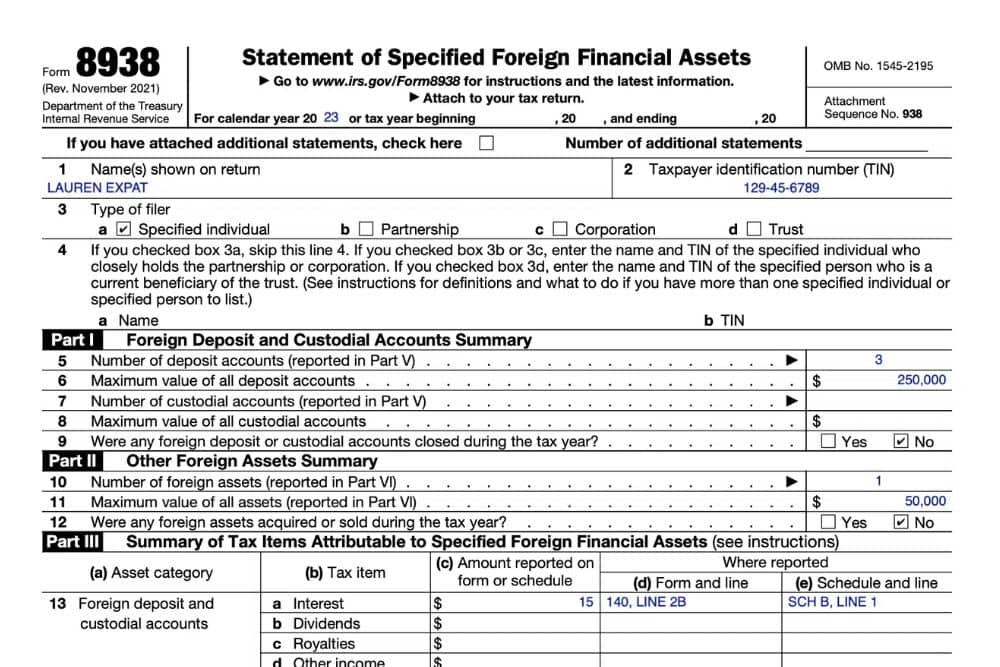All About Filing a 1040-NR Form for US Expats
November 22, 2022 | Tax Forms | 5 minute read
Expat Tax Blog. Tax Tips for US Americans abroad.
Updated January 14, 2025
 All blogs are verified by Enrolled Agents and CPAs
All blogs are verified by Enrolled Agents and CPAs
Updated January 14, 2025

Are you living in the United States as a nonresident alien? And wondering about your possible tax responsibilities in the US? Maybe, you are living abroad and have no connection to the US except that you have US assets and are, therefore, still legally bound to file a US tax return. Today we are reviewing the basics of Form 1040-NR: US Nonresident Alien Income Tax Return. While it may be a mouthful, the form is straightforward. Read on to learn all you need to know about filing Form 1040-NR.
What is a nonresident alien?
A “nonresident alien” is a non-US citizen without a Green Card or qualifying for the “substantial presence test.” Commonly, these are students from abroad who are studying in the US on a student visa, for example. Seasonal workers, visiting professors, visiting business people, and so on may also fall under the nonresident alien status.
The Substantial Presence Test Explained
To determine if filing Form 1040-NR is necessary, you’ll need to establish if you will be considered a US resident for tax purposes. You are automatically considered a US resident, even if not residing in the US if you have US Citizenship or hold a valid US Green Card. However, if those don’t apply to you, then you must complete the substantial presence test, also known as the “residency” test, to see which form to file.
The test is based on your living status for the past three years. Here is an example as we are gearing up for the 2024 tax season.
| You qualify if you are physically present in the United States for at least: |
|---|
| 31 days during 2024, and |
| 183 during 2024, 2023, and 2022 of that: |
| all days in 2024 |
| 1/3 of the days in 2023 |
| 1/6 of the days in 2022 |
Your present days of the last three years need to total 183 days. The IRS provides another example:
You were physically present in the US on 120 days in 2022, 2023, and 2024. To determine if you meet the substantial presence test for 2024, count the full 120 days of presence in 2024, 40 days in 2023 (1/3 of 120), and 20 days in 2022 (1/6 of 120). Since the total for the three years is 180 days, you are not considered a resident under the substantial presence test: for 2024
IRS citation
Exceptions to Days of Presence
Where there is a rule, there is an exception. Any time you are physically present in the US is a day of presence. Except when:
| Physical Presence Rule Exceptions |
|---|
| You regularly commute from Canada or Mexico for work and are a resident of Canada or Mexico. |
| You spend less than 24 in the US when in transit between 2 areas outside of the US. |
| Days spent on a foreign vessel as a crew member. |
| Days you were unable to leave the US due to a medical condition that developed while in the US |
| Days spent as an “exempt individual” including: 1) A teacher or trainee temporarily in the US under a “J” or “Q” visa, and is compliant with the visa requirements. 2) A student under an “F,” “J,” “M,” or “Q” visa; and is compliant with the visa requirements or 3) A professional athlete temporarily in the US to compete in a charitable sport event |
Who Needs to File Form 1040-NR?
If you pass the substantial presence test, you must file Form 1040. If you are neither a US Citizen nor a US Green Card holder nor do you pass the substantial presence test, then you need to file Form 1040-NR.
Using 1040-NR, you need to file an annual tax return if:
- You are engaged in a trade or business in the United States during 2024, even if you earned no income.
- You earned any US-sourced income, and not all the US taxes owed were withheld properly. More about that is below.
- You owe any special taxes like Alternative Minimum Tax, Excess IRA, or other Qualified Plan Taxes, etc.
Most non-residents with US businesses or assets are probably on the hook to file Form 1040-NR annually.
Tax Withholding
Tax withholding is when you are an employee, and your employer withholds income tax from your paycheck. They then pay it directly to the IRS in your name. You must be aware of any changes in your income throughout the year.
We recommend checking your withholding income early in the year and after any life changes. Changes include marriage, divorce, birth or adoption of a child, home purchase, retirement, or filing for bankruptcy.
You will also want to review your withholding when:
- Your wage income changes (you stop working or begin working a second job).
- Adjustments to income, including student loan interest deduction, alimony expense, etc.
- Medical expenses tax change, dependent care expenses, etc.
Your 1040-NR is due on the usual US tax schedule by April 15th. If you have an income that is not subject to withholding, you can file by June 15th without penalty.
What to Expect When Filing a 1040-NR
Form 1040-NR will likely be pretty straightforward for those required to complete it. If you are a nonresident with a single source of income and zero deductions, you will be faster to file the form on time. If you experience a more complex tax situation, we recommend keeping your files in order throughout the year for a smoother experience.
To help you avoid any financial penalties, MyExpatTaxes is here to help you with our team of Tax Professionals. We are experienced in assisting nonresident aliens in the US file Form 1040-NR and know the ins and outs!
MyExpatTaxes Makes Filing a 1040-NR Easy!
While our goal is to provide clear and cohesive information, we understand that everyone needs help from time to time. Our Help Center should be considered your jumping-off point to get answers first. If you want more personalized tax assistance, it is time to schedule an appointment with one of our expert Expat Tax Professionals.
Let us help take a weight off your shoulders this tax season. File with MyExpatTaxes today.

Written by Nathalie Goldstein, EA
Nathalie Goldstein, EA is a leading expert on US taxes for Americans living abroad and CEO and Co-Founder of MyExpatTaxes. She contributes to Forbes and has been featured in Forbes, CNBC and Yahoo Finance discussing US expat tax.
November 22, 2022 | Tax Forms | 5 minute read











